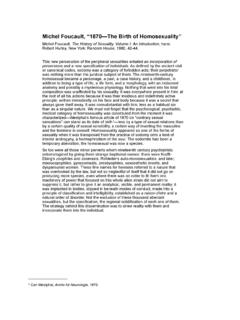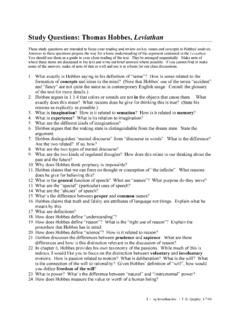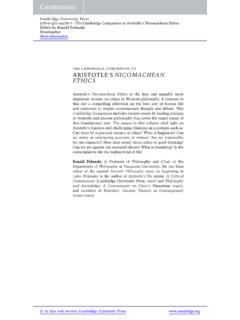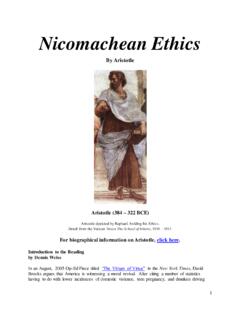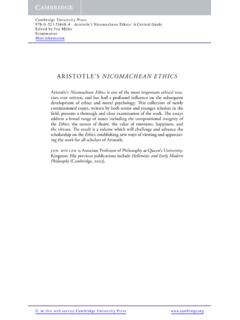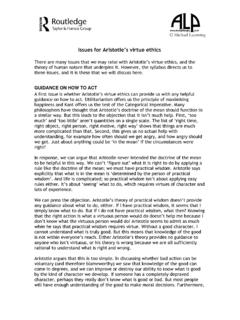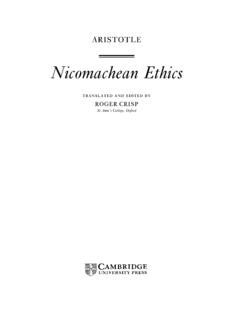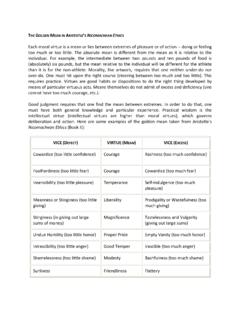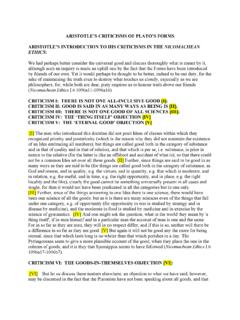Transcription of Brief Summary of Aristotle’s Nicomachean Ethics
1 Brief Summary of aristotle s Nicomachean EthicsI. Definition of the Subject and Nature of the ProblemA. Preliminary activity aims at some good. The highest good is the end (telos or goal) of that activity. Therefore, the goal (or end) of human activity is the highest good for man . [This argument is based on aristotle s metaphysical and theoretical assumption of a teleological point of view.] knowledge of this highest good should have a great influence on the way we must begin our investigation of the highest good by distinguishing between (a) that which is good for its own sake, and (b) that which is good for the sake of something else.
2 The highest good belongs in the category of that which is good for its own the good for all is better than the good for an individual, it is the common good that we seek to further proviso: This is an inexact science since it is concerned with that which is variable [as opposed to geometry, for example, which studies fixed rules and objects]. Thus, we can only expect as much precision as the subject matter is general agreement that happiness (eudaimonia), living well and doing well, is the highest of all human goods. But there is no general agreement as to what produces happiness.
3 So this is one of our first problems. [Note that the concept of happiness includes both a sense of well-being and a measure of success. According to this definition, one cannot be poor but happy. To the ancient Athenians, that would be a contradiction.] most common assumption about happiness is that it can be produced by a life of either (a) pleasure and wealth, (b) honor, or (c) contemplation. Since wealth is pursued for the sake of something else, and since honor is dependent on those who bestow it (rather than those who supposedly have it), it follows that neither can be the highest good.
4 Most virtues (honor, wealth, etc.) are chosen both for themselves and for the sake of something else, viz. happiness. But happiness, as stated above, is that which is an end in itself. Thus, we must look elsewhere for the kind of life which produces trying to give an account of happiness, we should keep in mind that it has the following characteristics: (a) It is the end of action. (b) It is self-sufficient, it makes life desirable and lacking in nothing. (c) It is complete, it is not a component or part of some larger The Function of a Human fully understand the goal of human life, we must also examine the function of the human being, that which distinguishes the human from all other forms of function is based on reason.
5 Thus, the highest human good must involve a life characterized by rational activity [as opposed to the mere capacity to reason]. reasoning in itself is not enough. We must reason well ( with virtue or excellence). And not just for a short time, but throughout a long and healthy life. [Remember, happiness is characterized both by well-being and prosperity.]II. The Nature and Acquisition of Moral VirtueA. Virtue is not instilled in us by nature (as is vision, hearing, touching, etc.). Rather, it is acquired by habit (ethos) through repetition and The purpose of moral education is not merely to know (theoretically) what virtue is, but to become good (virtuous).
6 This [Since I am not acting virtuously if I do the right thing by chance, I have to know what I am doing.] [I must choose to do what is good for its own sake.] [I must act from a constant character that is good.]C. In what part of the soul can we find this moral virtue? The soul is composed of three (feelings accompanied by pleasure or pain, desire, fear, love, hate, anger.) or capacities (those things in virtue of which we are capable of feeling passions) of character (how passions are felt and exercised, a tendency toward too much or too little anger, etc.)
7 D. In which of these is moral virtue found? [Argument by Elimination] are not called good or bad on the basis of our feelings, so it can t be are we good or bad on the basis of our capacity for experiencing passions, since we have such a capacity by nature. Rather, we are judged to be good or bad on the basis of our choices. So moral virtue can t be a faculty or , it must be a state of character. (That is its genus.)E. But what differentiates moral virtue from other states of character? It is a state of character that allows one to perform one s function well, to be a good human being.
8 How does this happen? When one avoids extremes and chooses the Doctrine of the MeanA. The mean is not strict or arithmetical. It is defined by reason as one with practical wisdom (phronesis) would define it. The following are four examples:ACTIVITYVICE (excess)VIRTUE (mean)VICE (defect)facing deathcowardicecouragefoolhardinessgiving moneyprodigalityliberalitystinginessclai ming honorsvanitypridehumilitysocial intercourseobsequiousnessfriendlinesssul kinessB. Not all vices have corresponding virtues. Theft, murder, adultery, etc. are bad in themselves, not as extremes.
9 [Recall aristotle 's initial remarks about precision.]C. The mean is hard to obtain. It is grasped by a kind of intellectual virtue (practical wisdom) which operates in a way similar to perception, one has to see that this is a situation that calls for a certain sort of SummaryVirtue is a state of character concerned with choice, lying in the mean relative to us, as defined by reason and as one with practical wisdom would define Quigley, 2 May 122

